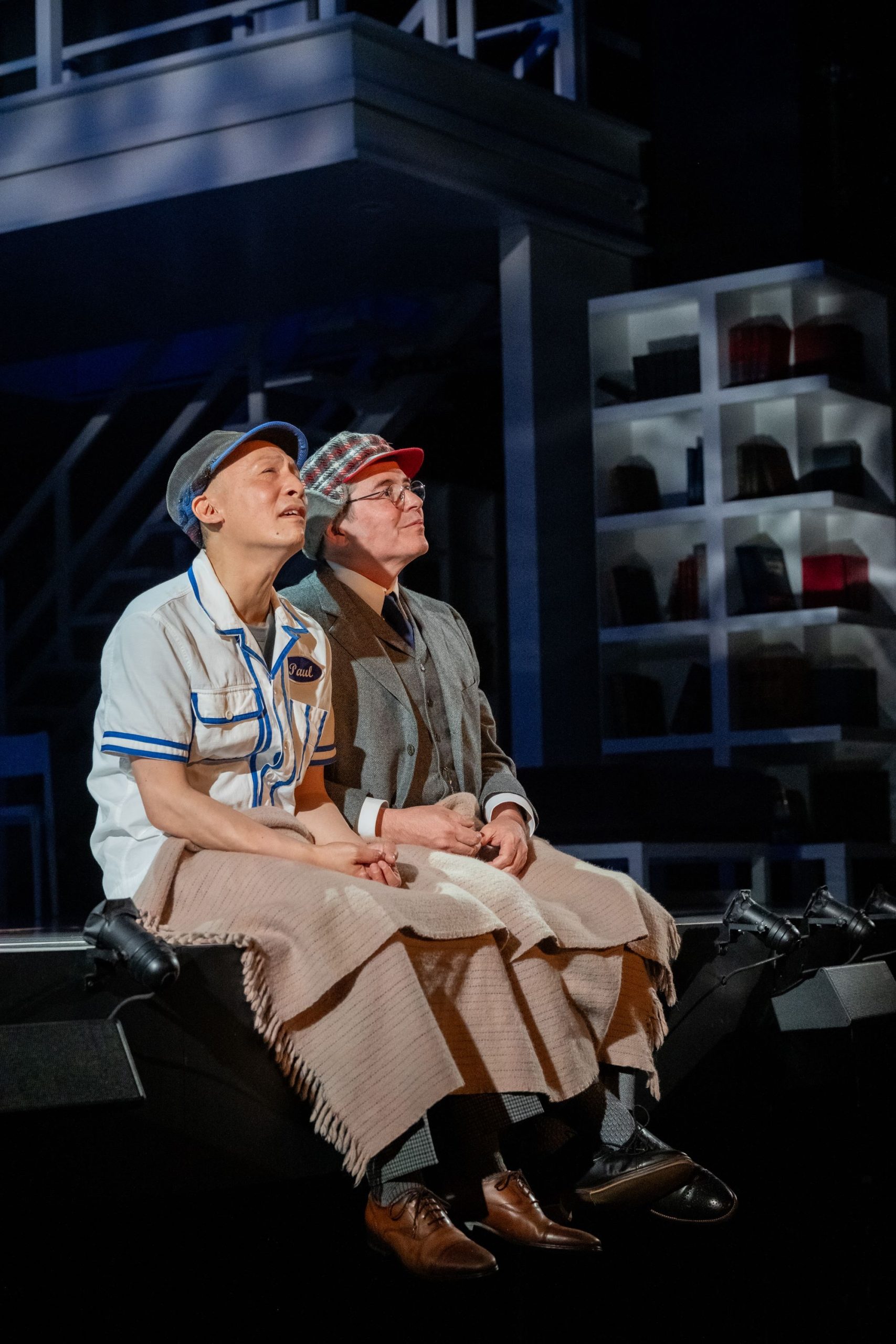Fandango for Butterflies (and Coyotes) in the Press

‘Fandango para mariposas (y coyotes)’, es una reflexión de los sueños y temores de los migrantes
POR ALEJANDRO MACIELEDITORIAL DIRECTOR, LOS ANGELES TIMES EN ESPAÑOL
September 15, 2022
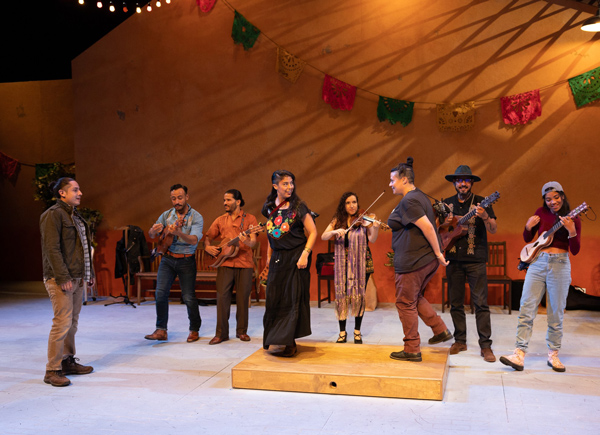
El reparto de “Fandango for Butterflies (and Coyotes)” de En Garde Arts en La Jolla Playhouse.(Courtesy of Rich Soublet II)
Hay que haber emigrado, en cualquiera de sus formas, para entender la trascendencia de “Fandango para mariposas (y coyotes)” una obra de Andrea Thome, que se presenta actualmente en La Joya Playhouse de San Diego, y donde se examina a través de un grupo de personajes, el proceso de emigrar con todas sus vicisitudes, y las dificultades para adaptarse a un nuevo país, a nuevas costumbres e incluso a un nuevo idioma.
Aunque la obra fue concebida en Nueva York, con entrevistas con migrantes de todas partes, en la adaptación para San Diego, el guion se modificó para retratar principalmente la experiencia mexicana y centroamericana, donde el tren de carga “La Bestia”, juega un papel fundamental y donde los coyotes, controlados ahora por el crimen organizado, son parte del peligroso proceso migratorio.
Pero no nos confundamos. Esta obra no habla de las tragedias. Fandango para mariposas (y coyotes), celebra la fuerza, la resistencia y la imaginación de los inmigrantes que se reúnen una noche para celebrar un fandango en una iglesia santuario de San Diego.
Thome, cuyos padres son chilenos y costarricenses-estadounidenses, dijo que los inmigrantes sufren en sus viajes a Estados Unidos, así como en su proceso de asimilación, pero eso es sólo una parte de lo que son. Y los fandangos -reuniones con canciones, bailes y relatos improvisados- celebran la valentía de los inmigrantes, su triunfo contra las adversidades y su experiencia compartida.
Fandango, capta a la perfección la disyuntiva del migrante, que se mantiene dividido en sus afectos, entre el país de origen y el país de bienvenida.
Read More
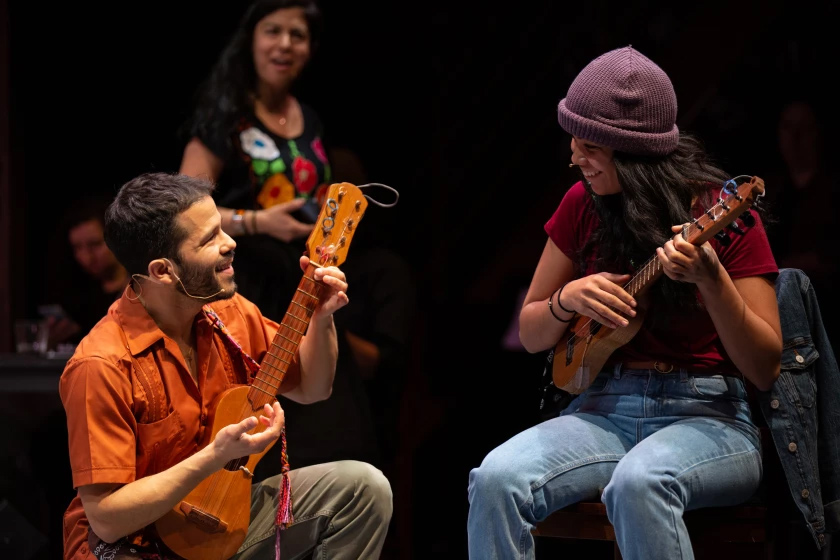
Carlo Albán, Jen Anaya y Silvia Dionicio en “Fandango for Buterflies (and Coyotes)” de En Garde Arts, que se representa del 30 de agosto al 25 de septiembre en La Jolla Playhouse.(Maria Baranova)
Cuantos casos no hemos escuchado a lo largo de nuestra vida como migrantes, de fulano de tal, que dejó a su esposa e hijos en el pueblo, y que después de años de no verlos, se ha enamorado y formado una nueva familia en Estados Unidos.
Fandango nos hace recordar el temor permanente que viven millones de personas ante la posibilidad de que llegue la migra y te deporte aun por el motivo más insignificante.
El director José Zayas, en colaboración con el director musical Zinuhé Padilla, creo una historia bilingüe, en la que los actores hablan en inglés, pero cantan en español y cada palabra es traducida en pantallas de vídeo en el otro idioma.
El elenco está formado por músicos y cantantes de gran talento, con varios actores excepcionales. Jen Anaya es el corazón cálido del espectáculo en el papel de Mariposa, una trabajadora que emigró de México 18 años antes y que está enamorada de Rogelio (magistralmente interpretado por Carlo Albán), un trabajador que sigue casado con la esposa que dejó en Honduras una década antes. Danny Ray Caraballo destaca en el papel de Elvin, primo de Rogelio que espera desesperado el proceso de deportación.
Silvia Dionicio interpreta a Rafaela, una adolescente dominicana abandonada por sus padres cuando era un bebé y criada en Estados Unidos con el sueño de convertirse en policía. Roberto Tolentino interpreta a Johan, el primo gay de Rogelio y Elvin que ha huido a Estados Unidos temiendo por su vida. Y Frances Inés Rodríguez proporciona un alivio cómico como Pili, una inmigrante mexicana dotada de tecnología que, como Rafaela, es residente legal. Zinuhé Padilla y la violinista Tania Mesa proporcionan un extraordinario acompañamiento musical.
Aunque en algunos momentos la obra se siente “pesada” por los largos diálogos, Fandango ofrece unas excelentes escenas de canto y baile en donde los personajes dramatizan su experiencia migratoria de una manera poética.
Después de cada representación se celebra un fandango interactivo con el público en el exterior del teatro, y una vez terminada la función en el Playhouse.
Producido por En Garde Arts de Nueva York, “Fandango for Butterflies (and Coyotes)” se estrenó en febrero de 2020 en el club de teatro experimental La Mama, en el barrio de Bowery de Manhattan. La gira de cinco ciudades prevista originalmente para el espectáculo se vio interrumpida por la pandemia, pero se reanudó el pasado otoño. Desde entonces, la producción de En Garde Arts ha viajado a Penn State y a la Universidad de Maryland. En consonancia con el espíritu de En Garde y con el tema de la obra, a la representación en La Jolla Playhouse le seguirá una semana de funciones gratuitas en centros comunitarios de Chula Vista, San Ysidro, Escondido y Oceanside, entre otros, para llegar a las comunidades de inmigrantes del condado.
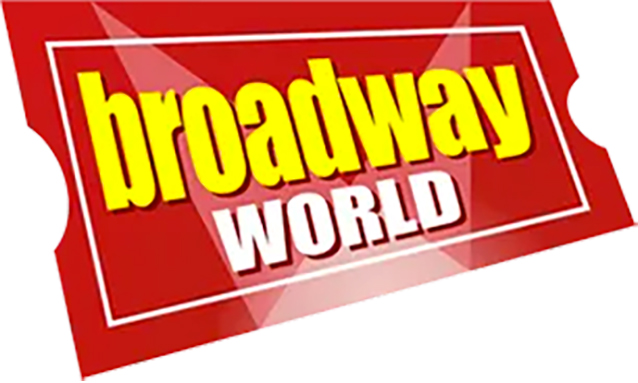
Review: FANDANGO FOR BUTTERFLIES (AND COYOTES) brings hope and heartache to the La Jolla Playhouse
Playing through September 25th at La Jolla Playhouse
By E.H. Reiter
September 11, 2022

The cast in La Jolla Playhouse’s production of En Garde Arts’ FANDANGO FOR BUTTERFLIES (AND COYOTES); photo by Rich Soublet II.
FANDANGO FOR BUTTERFLIES (AND COYOTES), inspired by real-life stories brings empathy, hope, and heartache to the La Jolla Playhouse stage through September 25th.
The show opens at the start of a gathering at a sanctuary located in Chula Vista (originally New York where the piece was created). The event brings characters from various backgrounds and experiences together to celebrate and support each other. As the show progresses the festivities of this fandango bring people’s stories to life through music and dance.
Everyone at this fandango is an immigrant, and all have been transformed by how that experience (legal or not) has shaped lives. Mariposa (Jen Anaya) is the main coordinator of the fandango and she works at a deli to support her mother back home. She has been in the US for 18 years and has formed a friendship and a potential romantic bond with Rogelio (Carlo Albán) who is from Honduras.
Rogelio and his cousin Elvin (Danny Ray Caraballo) both work at a stable and are anxiously awaiting news from their cousin Johan (Roberto Tolentino) who is fleeing to the states because life in his native town has proven too dangerous to stay.
Pili (Frances Ines Rodriguez) is a legal immigrant who brings a lot of humor, and music to the proceedings. Her openness allows Rafaela (Silvia Dionicio), a first-timer to the fandango who is also a legal immigrant to relax and share the family dynamics that shaped her childhood.
Sinuhé Padilla provides musical accompaniment throughout the piece along with talented violinist Tania Mesa.
This talented ensemble brings their joys, challenges, and sadness vibrantly to life through acting, singing, and dancing. The show is funny and heartfelt, and the Spanish language folk numbers are lovely, as is a sequence portraying the journeys of crossing the border.
Read More
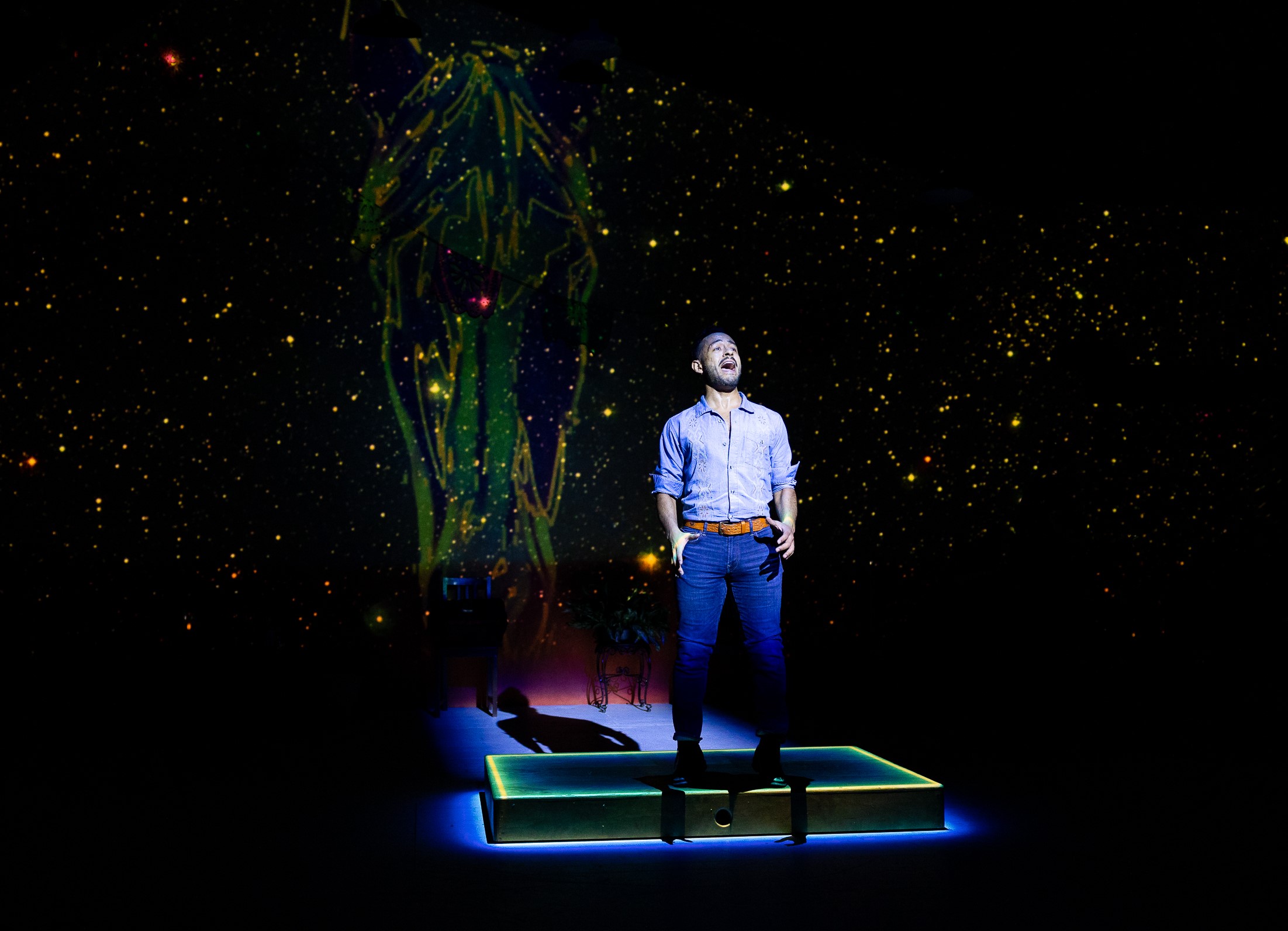
Danny Ray Caraballo in La Jolla Playhouse’s production of En Garde Arts’ FANDANGO FOR BUTTERFLIES (AND COYOTES); photo by Rich Soublet II.
This bilingual piece with music and dance is a production from En Garde Arts and is based on years of research and interviews with immigrants. The characters switch between languages but the theatre has subtitles in both languages so the audience knows what is being said in either language.
Written by Andrea Thome, and directed by José Zayas in collaboration with music director and composer Padilla, and with movement by Alexandra Beller, the show is a celebration of life, sadness, resilience, and love. Scenic and projection design by Johnny Moreno Aguilar, lighting design by Lucrecia Briceno, costumes by Fabian Fidel Aguilar, and sound design by sound design Marcelo Añez all complement each other to tell the story.
While the show explores the long hours, the financial hardships, and the fears of raids or deportation, it also showcases the joy and the love that has brought them to this place. This is especially highlighted during the musical moments featuring the jaranas (stringed instruments that resemble a ukulele) while dancing two by two on the tarima (a small wooden platform that turns the dancing into rich percussion), and singing.
Anaya’s Mariposa (which means butterfly in Spanish) describes the transformative process of leaving one home to find another like caterpillars and butterflies. Caterpillars have to break down and transform from what they were to become a butterfly; which is beautiful and fragile, and can traverse so much and “go so far.” Yet, thanks to that process butterflies can also never truly return to who they were before.
FANDANGO FOR BUTTERFLIES (AND COYOTES) is a vibrant story of people who want to live their dreams beyond the difficulty of their situation, by bringing joy and defiance in the face of fear.

La Jolla Playhouse’s ‘Fandango’ takes a deeper, more nuanced look at the immigrant experience
The bilingual En Garde Arts production, playing through Sept. 25, will be followed by a series of free performance countywide
By Pam Kragen
September 8, 2022
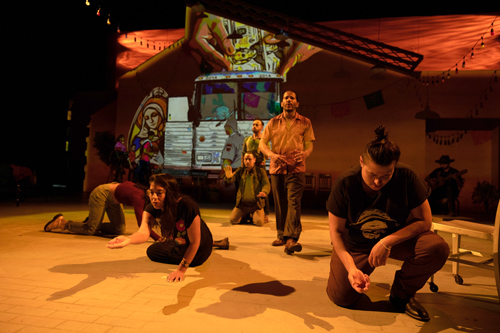
A scene depicting immigrants’ journey to America in En Garde Arts’ “Fandango for Butterflies (and Coyotes)” at La Jolla Playhouse. (L-R) Silvia Dionicio, Jen Anaya, Roberto Tolentino, Carlo Albán and Frances Inez Rodriguez in La Jolla Playhouse’s production of En Garde Arts’ FANDANGO FOR BUTTERFLIES (AND COYOTES); photo by Rich Soublet II.
In Andrea Thome and Sinuhé Padilla’s play with music “Fandango for Butterflies (and Coyotes),” there’s a song lyric that goes: “You left because of trouble. Now the trouble is your life.”
That’s a common theme in the lives of the immigrant characters who gather at a fandango party to share and sing stories of how they came to the United States and the challenges they’ve faced in the years since. Each has struggled to make a life here and maintain connections with those they left behind, but living divided lives has left deep scars.
La Jolla Playhouse is presenting the West Coast premiere of En Garde Arts’ 2020 production of “Fandango.” Playwright Thome originally set the play in New York, but for this run it has been re-set at a “sanctuary” church in San Diego and references to Barrio Logan and Chula Vista are sprinkled into the script. That’s problematic, though, since the frequent immigrant raids the “Fandango” characters dread don’t happen here, and the dynamics of living here on the U.S.-Baja border are different from the displacement immigrants experience living thousands of miles away in New York.
Read More

The cast in La Jolla Playhouse’s production of En Garde Arts’ FANDANGO FOR BUTTERFLIES (AND COYOTES); photo by Rich Soublet II.
Nonetheless, the 90-minute play — with vibrant, heart-pounding and moving songs and music by composer Padilla — is a fascinating 90-minute examination of the immigrant experience. Thome based the script on interviews she conducted with New York-area immigrants from Latin America and their fictionalized stories in the play have the ring of truth.
Director José Zayas, in collaboration with music director Padilla, has created a bilingual story, where the actors speak in English but sing in Spanish and every word is translated on video screens in the other corresponding language.
The ensemble cast are all talented musicians and singers, with several exceptional actors in the mix. Jen Anaya is the show’s warm heart as Mariposa, a deli worker who immigrated from Mexico 18 years earlier and is torn in her love for Rogelio (played with deep tenderness by Carlo Albán), a stable worker who’s still married to the wife he left behind in Honduras a decade before. Danny Ray Caraballo gives a standout performance as Elvin, Rogelio’s cousin and fellow stable worker, who is warily awaiting deportation proceedings.
Dominican-born Silvia Dionicio credibly plays Rafaela, a Dominican teen abandoned as a baby by her parents and raised in the U.S. with the dream of becoming a cop. Roberto Tolentino plays Johan, Rogelio and Elvin’s gay cousin who has fled to the U.S. in fear for his life. And Frances Ines Rodriguez provides comic relief as Pili, a technologically gifted Mexican immigrant who, like Rafaela, is a legal resident. Padilla and violinist Tania Mesa provide expert musical accompaniment.
The show’s best moments are the song and dance scenes, and the powerful moments when the characters dramatize their journeys to America with poetically set to movement by Alexandra Beller.
Every performance is followed by an audience-interactive fandango outside the theater, and after the Playhouse run ends, the production will tour the county for a series of free performances. Dates, locations and details of these shows will be released in the coming weeks at lajollaplayhouse.org
Read at The San Diego Union-Tribune
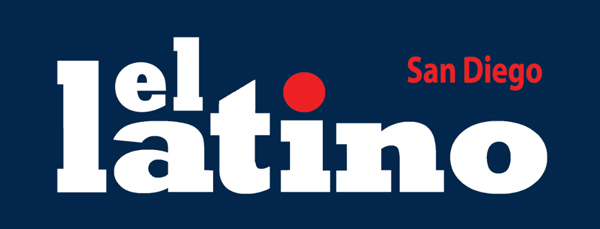
La Jolla Playhouse mostrará Fandango para mariposas (y coyotes) en su estreno
By Sarah Berjan
September 6, 2022
La Jolla Playhouse mostrará Fandango para mariposas (y coyotes) en su estreno en la costa oeste el miércoles, invitando a la audiencia a experimentar una reunión musical informal popular entre los inmigrantes, y está en vísperas de una redada en toda la ciudad.
La obra está escrita por Andrea Thome, y dirigida por José Zayas, con música original de Sinuhé Padilla, estará en el escenario a partir del 7 de septiembre a las 7 p.m. hasta el 25 de septiembre. en el Mandell Weiss Forum en La Jolla Playhouse. Es una celebración de la resiliencia y la camaradería que se puede construir cuando los extraños se vuelven amigos, los amigos se vuelven familia y la música sigue sonando.
Read More
“Estamos encantados de dar la bienvenida una vez más a Anne Hamburger con En Garde Arts y su aclamada producción de Fandangos para mariposas (y coyotes). Este cálido y alegre homenaje a las comunidades inmigrantes indomables: personas que se unen con entusiasmo para cantar y compartir historias, incluso en medio de una amenaza persistente fuera de sus muros, lo que resalta la necesidad intrínseca de conexión con la humanidad”, dijo Christopher Ashley, director artístico. del teatro de La Jolla.
Los fandangos son encuentros vibrantes en los que la música y la danza dan vida a las historias de una comunidad. La obra está inspirada en entrevistas con inmigrantes de América Latina, muchos de los cuales hicieron un viaje peligroso a los Estados Unidos, según el teatro.
La obra se presenta en inglés y español, con subtítulos, para hacerla accesible al público en ambos idiomas. Además, después de cada función, se invita al público a participar de un fandango Informal con los actores fuera del teatro.
La casa de juegos y En Garde Arts presentarán una serie de actuaciones comunitarias gratuitas en asociación con centros comunitarios locales y escuelas en Chula Vista, San Ysidro, Escondido y Oceanside, entre otros.
Visite La Jolla Playhouse para obtener más información, ver los horarios y comprar boletos.
Read in English at Chula Vista Today

‘Fandango for Butterflies (and Coyotes)’ at La Jolla Playhouse
KPBS Midday Edition – Weekend Arts Preview
September 1, 2022
The new play, written by playwright Andrea Thome with music composed by Sinuhé Padilla, is set in a community “fandango.” The term means a specific dance, but it’s also a joyous gathering and celebration with storytelling, music and dance that’s common to Latin American immigrant communities. In the play, this particular fandango is just before Immigration and Customs Enforcement (ICE) raids take over the city.
Details: On stage through Sept. 25, 2022. This weekend’s performances are 8 p.m. Thursday through Saturday, Sept. 1-4, and 7 p.m. Sunday, Sept. 4, 2022. La Jolla Playhouse, 2910 La Jolla Village Dr., UC San Diego. $25-$60.

La Jolla Playhouse’s ‘Fandango for Butterflies’ will tell immigrants’ stories with music, dance and joy
Following the bilingual and interactive play’s run in La Jolla, it will tour community centers countywide for free performances
By Pam Kragen
August 26, 2022

Carlo Albán, Jen Anaya and Silvia Dionicio in En Garde Arts’ “Fandango for Buterflies (and Coyotes),” which plays Aug. 30 through Sept. 25 at La Jolla Playhouse. (Courtesy of Maria Baranova)
Thanks to San Diego’s proximity to an international border, many of its local theaters have produced plays and musicals over the years about the immigrant experience.
But playwright Andrea Thome said that too many of the immigrant stories she has seen portrayed in the American media focus on their suffering and struggle. Her play “Fandango for Butterflies (and Coyotes),” which opens Tuesday in its West Coast premiere at La Jolla Playhouse, instead celebrates the strength, resilience and imagination of immigrants who come together one night for a fandango celebration at a New York community center.
Thome, whose parents are Chilean and Costa Rican-American, said immigrants do suffer in their journeys to America as well as their assimilation process, but that’s just one piece of who they are. And fandangos — joyful multicultural gatherings of improvised song, dance and storytelling — celebrate immigrants’ bravery, triumph against the odds and their shared experience.
“I see immigration as a radicalization of imagination,” Thome said in a recent interview. “You have to imagine your life in a place you’ve never been, and you have to draw on that store of imagination to get you through what can be a very difficult journey for some people. Fandangos celebrate that imagination, creativity, community and solidarity.”
Read More
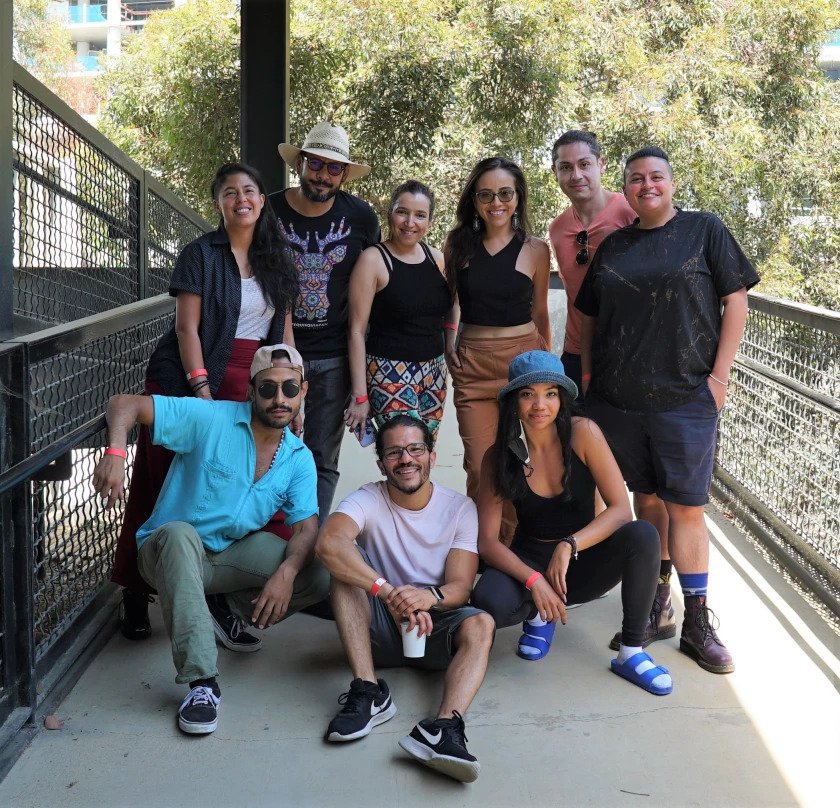
The cast of “Fandango for Butterflies (and Coyotes)” at La Jolla Playhouse. Back row from left: Jen Anaya, Sinuhé Padilla, Tania Mesa, Celest Lanuza, Roberto Tolentino and Frances Ines Rodriguez. Front row: Danny Ray Caraballo, Carlo Albán and Silvia Dionicio. (Courtesy of La Jolla Playhouse)
Produced by New York’s En Garde Arts, “Fandango for Butterflies (and Coyotes)” made its world premiere in February 2020 at the La Mama experimental theater club in Manhattan’s Bowery neighborhood. The show’s originally planned five-borough city tour was interrupted by the pandemic, but it resumed last fall. Since then, the En Garde Arts production has traveled to Penn State and the University of Maryland. In keeping with En Garde’s site-specific ethos and the play’s subject matter, the La Jolla Playhouse run will be followed by a week of free shows at community centers in Chula Vista, San Ysidro, Escondido, Oceanside and more, as an outreach to the county’s immigrant communities.
Playhouse artistic director Christopher Ashley describes “Fandango” as a “warm and joyous show.”
“It’s a celebration of indomitable immigrant communities — people enthusiastically gathering to sing and share stories, even in the midst of a threat that lingers just outside their walls, underscoring humanity’s intrinsic need for connection,” Ashley said in a statement.
En Garde Arts was founded in 1986 by Anne Hamburger. In 1999, she closed En Garde to accept a position as artistic director of La Jolla Playhouse, but she left after just one year for a top creative post in Disney’s theme parks division. She returned to New York in 2008 and relaunched En Garde in 2014.
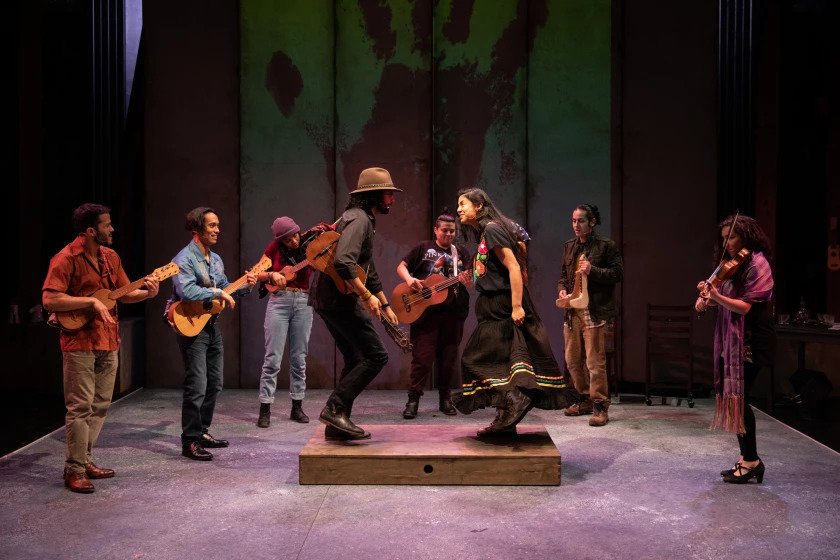
The En Garde Arts production of “Fandango for Butterflies (and Coyotes)” opens Aug. 30 at La Jolla Playhouse. (Courtesy of Maria Baranova)
Thome said Hamburger reached out to her in spring 2017 and asked if she’d be interested in developing a play based on interviews with undocumented immigrants in New York. Intrigued with the idea, Thome began interviewing friends and acquaintances who — like herself — came from immigrant backgrounds. After gathering 15 stories from a variety of Latin American immigrants, she presented the play’s first reading in November of that year.
It was a straight, verbatim documentary-style play with a little music mixed in, but the six central characters had no interaction or relationship with one another. To give the play more of an interactive narrative, Thome worked with composer Sinuhé Padilla and director José Zayas to tell the now-fictional characters’ experiences at a fandango event.
The fandango tradition originated about 400 years ago in the region of Veracruz, Mexico, though similar events occurred earlier in Spain and Africa. Because immigrants in Veracruz spoke different languages and dialects, they found a common language when they gathered together for an evening of music, dance and storytelling. The folk music style that originated in Veracruz is known as son jarocho. Immigrants would gather around a wood platform, play instruments, sing in Spanish and other languages and rhythmic tap-dancing, a style that has carried on to this day.
“Fandango for Butterflies (and Coyotes)” features an original son jarocho score by Sinuhé Padilla, a Mexican musicologist, producer and artistic director. Padilla leads fandangos around the country, and he is the lead musician in the “Fandango for Butterflies” cast.
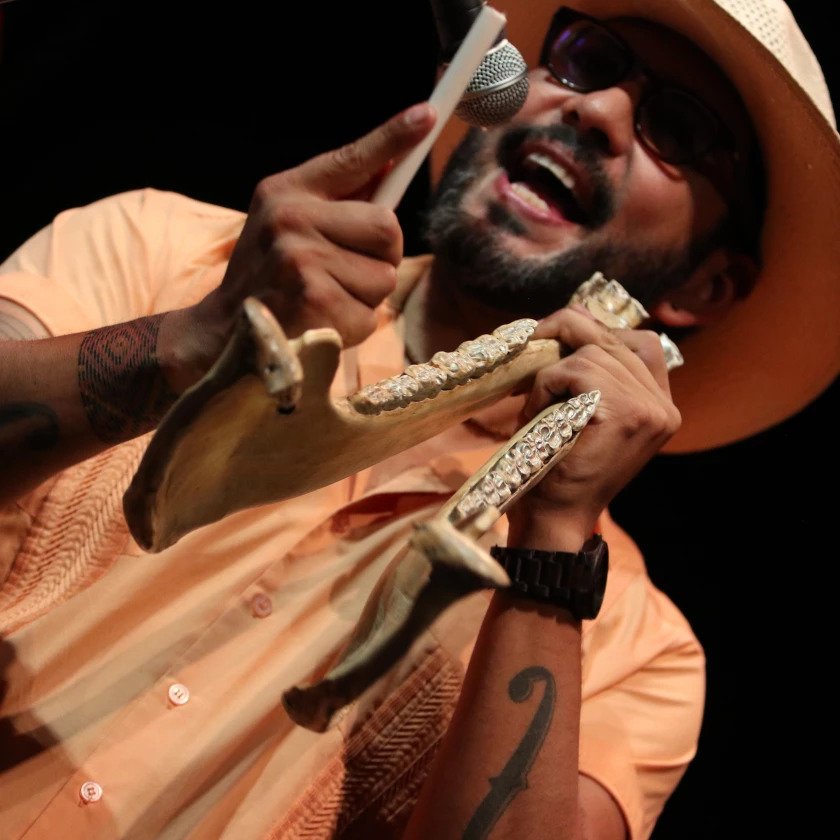
Sinuhé Padilla is the composer and lead musician in En Garde Arts’ “Fandango for Butterflies (and Coyotes),” opening Aug. 30 at La Jolla Playhouse. (Courtesy of Maria Baranova)
Padilla said that while there is a vibrant and world-famous fandango culture in Veracruz, contemporary fandangos communities have popped up around the world, including Japan, Europe, South America and New York City. There’s also a long-running fandango Fronterizo festival that’s staged each year at the Friendship Park wall between San Ysidro and Tijuana.
“Fandango for Butterflies (and Coyotes)” takes place at a community hall, where a group of immigrants from Latin America have gathered for a fandango. There they await news of loved ones who have yet to arrive in America, celebrate the return of family members and worry about those who may have been caught up in immigration raids, like the one that is expected the following morning. The play’s lead character, played by Jen Anaya, is “Mariposa,” the Spanish word for butterfly. Although Mariposa is a fictional character, many of the stories the characters tell are drawn directly from Thome’s interviews with Mexican, Honduran and Dominican immigrants.
“The play is about something that is not fiction,” Padilla said. “It’s a real story and a real community center that exists in New York and many countries around the world. It’s this beautiful tradition held by people who immigrate to this country who share an identity. You don’t have to be Mexican, you don’t have to be a dancer and you don’t have to be a musician. You can just be a person who goes and shares their story and traditions.”
Padilla said that because the play has been produced at different site-specific locations and the cast changes from time to time, the show changes slightly from night to night, in keeping with the improvisational nature of fandango. The stories and score are bilingual, but live translations are projected onstage in both English and Spanish. And at the end of each performance, the audience is invited to join the fandango cast outdoors, if they choose.
Thome said reactions to the show vary, depending up on the audience members’ personal experiences.
“We see a lot of tears, a lot of laughter and a lot of emotions about feeling represented,” she said. “There’s also a feeling of freedom afterward. The fandango allows you to free yourself.”
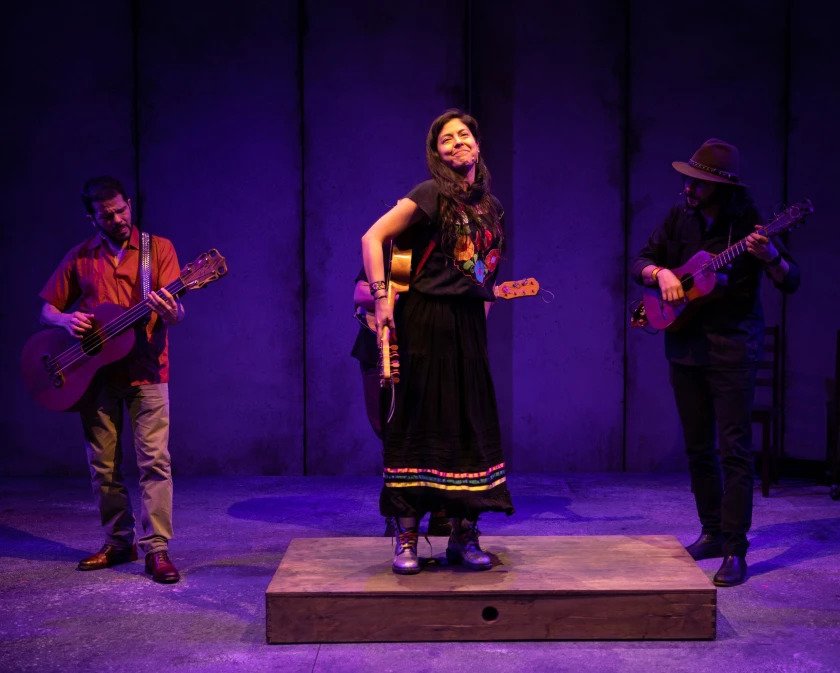
Carlo Albán, left, Jen Anaya and Sinuhé Padilla in En Garde Arts’ “Fandango for Butterflies (and Coyotes),” opening Aug. 30 at La Jolla Playhouse. (Courtesy of Maria Baranova)
‘Fandango for Butterflies (and Coyotes)’
When: Opens Tuesday and runs through Sept. 25. 7:30 p.m. Tuesdays and Wednesdays. 8 p.m. Thursdays and Fridays. 2 and 8 p.m. Saturdays. 2 and 7 p.m. Sundays
Where: La Jolla Playhouse at the Mandell Weiss Forum, 2910 La Jolla Village Drive, UC San Diego, La Jolla
Tickets: $25 to $65
Phone: (858) 550-1010
Online: lajollaplayhouse.org
» Download the Night & Day feature
Read at The San Diego Union-Tribune
Lee la historia en Union-Tribune en Español

How to Deal With the Anxieties of Immigration? Break Into Song
The actors and musicians behind “Fandango for Butterflies (and Coyotes)” see themselves in the stories they will share, and sing about, onstage.
By Rob Weinert-Kendt
Feb. 3, 2020
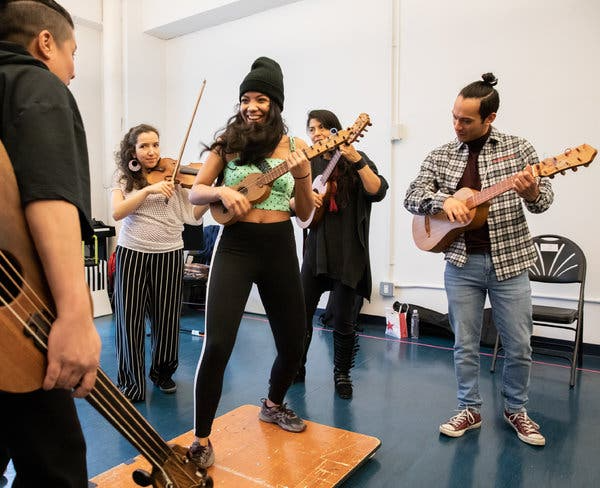
From left: The cast members Frances Ines Rodriguez, Tania Mesa, Silvia Dionicio, Jen Anaya, and Andres Quintero practice the song “El Siquisirí” as they rehearse “Fandango for Butterflies (and Coyotes).” Credit: Krisanne Johnson for The New York Times
Snow flurries swirled against the window, but the atmosphere inside a Manhattan rehearsal room on a recent Saturday afternoon was comparatively balmy, warmed by the insistent triple meter of son jarocho, folk music from the Gulf of Mexico. Six actors, led by Sinuhé Padilla, a musician who specializes in the style, were working through a climactic moment in “Fandango for Butterflies (and Coyotes),” a new play about immigration by Andrea Thome that will be produced at venues in all five New York City boroughs, starting at La MaMa on Feb. 6.
As the performers strummed lean Mexican mini-guitars called jaranas and stomped their feet on a flattened rehearsal table (a stand-in for the bespoke tarima that will be used in performances), they also reached some dramatic epiphanies.
This was the moment in the play when their characters, all of them immigrants with varying degrees of documentation, cut loose after a night of shared anxieties and hopes — about intermittent contact with far-flung family members, about the looming threat of raids by Immigrations and Customs Enforcement (ICE), about simply making it through another day in a nation that seems increasingly hostile to their presence.
Read More
“I want to kiss her after that,” said Silvia Dionicio, whose character, Rafaela, has been lightly flirting with Pili, played by Frances Ines Rodriguez, throughout the show. Rafaela just danced on the tarima opposite Pili, singing a verse in English about feeling abandoned by her mother, with Pili mirroring it back to her in Spanish. Why not seal their rapport with a smooch?
The play’s director, Jose Zayas, encouraged Dionicio to try it in the next run-through, and it worked, sending Rodriguez into an adorable impromptu swoon.
“Fandango” has emerged from Uncommon Voices, a new-works program of the company En Garde Arts, which staged site-specific productions throughout New York City in the 1980s, but now, under its longtime artistic director Anne Hamburger, has transitioned to works with a social-justice emphasis and a documentary theater aesthetic.
Like “Basetrack Live,” a 2014 En Garde show built from the testimonies of United States Marines returning from service in Afghanistan, “Fandango” began as verbatim theater, with actors reading firsthand accounts Thome gathered from immigrants.
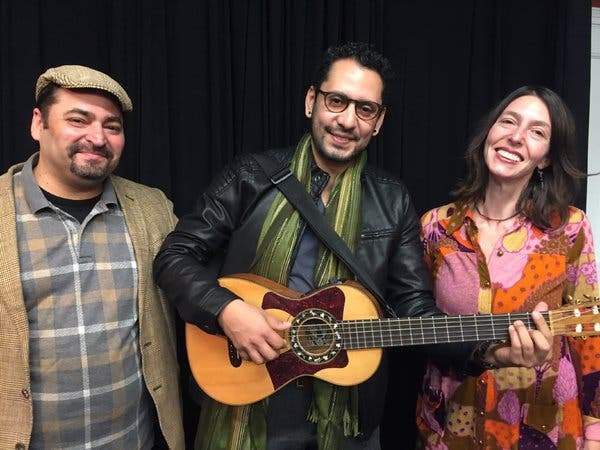
The show’s director Jose Zayas with its composer, Sinuhé Padilla, and the playwright Andrea Thome. Credit: Anne Hamburger
Thome, whose 2013 play “Pinkolandia” told the tale of her own Chilean/German heritage, first reached out to friends and acquaintances. Her sources grew to include a horse groomer from upstate New York who showed her an ankle monitor he is required to wear, and a deli manager in Manhattan who first came on foot to the United States as a teenager, and in the decades since has managed to send enough money back to Guerrero, a state in Mexico, for her mother to buy a house there — but whose undocumented status means she cannot return for a visit.
Hardship was only half of the stories Thome encountered, though. The immigrants she knew and met also spoke with pride of the lives they’ve built and bonds they’ve formed in the United States. That same deli manager, for instance, who is the basis for the character Mariposa, said in an interview that she still plans one day to visit her mother, own a red sports car, and, most importantly, have a child of her own. She’s even picked out a name: Esperanza, Spanish for “hope.” (She declined to give her name for this article.)
Thome was particularly moved, she said in an interview, by the “courage of that act of imagination people undertake when they emigrate, where they say, ‘I’m going to throw everything away, I have no idea who I am going to be.’ It’s mind-blowing and beautiful, and so creative.”
Searching for a way to reflect that creativity, Thome hit upon the idea of putting a group of immigrants, lightly fictionalized from the interviews she’d done, together at a fandango, a sort of Mexican hootenanny where everyone takes part in stomping, strumming, and trading improvised sung verses called décimas.
Padilla, who is composing an original score for the show and who leads a regular Monday night jarocho workshop/jam at City Lore in the East Village, confirmed that a fandango is a plausible meeting place for a group like this, since “60 or 70 percent of the people in fandangos in the U.S. are immigrants.”
Real-life fandangos can stretch into the wee hours, even go on for days. While performances of “Fandango” are not planned to reach such lengths, they will conclude with an extended musical celebration which audience members are welcome to join.
The show’s producers have even promised to waive admission for any patron who shows up with a jarana. (After La MaMa, “Fandango” will play at LaGuardia Performing Arts Center in Queens, Snug Harbor Cultural Center in Staten Island, Lehman Stages and the Point in the Bronx, and Irondale Center in Brooklyn.)
But this is a party with a point, and with an unmistakable political valence in a time when our nation’s immigration debate has risen to a boil of nativism on one side and activism on the other, with immigrants themselves left to struggle for a foothold. (It’s hardly the only critical theatrical representation of United States immigration policy: Waterwell’s “The Courtroom” and “Sanctuary City,” opening next month at New York Theater Workshop, are two more among many.)
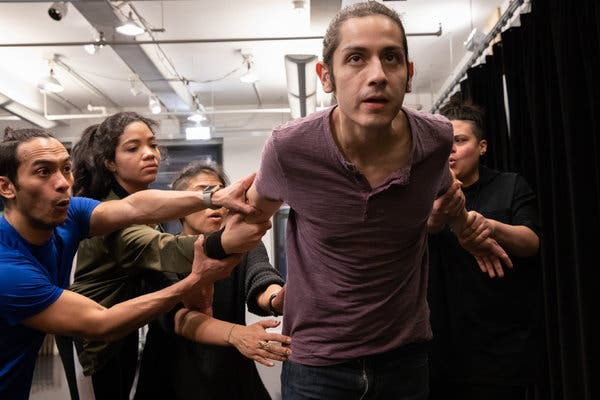
Cast members from left: Quintero, Dionicio, Anaya, Roberto Tolentino, and Rodriguez. Credit: Krisanne Johnson for The New York Times
In the “Fandango” rehearsal room that recent Saturday, the celebratory mood gave way to intimate reflection as the performers put down their instruments and spoke about their own relationship to the play and its stories.
Jen Anaya, who plays Mariposa, the character based on the deli manager, grew up in Arizona as the granddaughter of braceros, Mexican farm laborers first allowed to work in the United States in the 1940s, then later expelled. “My father was kicked out while my mom was pregnant with me,” said Anaya, who described reading the script for the first time and “sobbing in the subway.”
A few cast members recalled tourist visas employed as shortcuts to residency. Roberto Tolentino, who plays a sort of narrator figure, Johan, said his grandmother, though she had a home and a job in the United States, had to resort to an illegal border crossing to get back to them when her tourist visa was torn up by a border agent and she was sent back to Mexico.
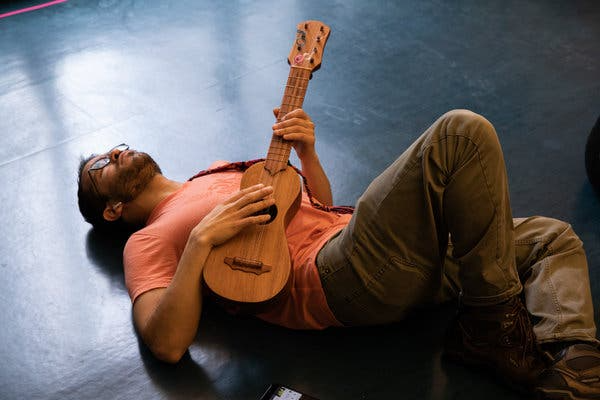
Carlo Albán, who plays Rogelio, during a recent rehearsal. Credit: Krisanne Johnson for The New York Times
Carlo Albán, who plays the thoughtful Rogelio, came from Ecuador when he was 7 with his entire family, who overstayed their tourist visas in hopes that stateside family members would sponsor them. Complications ensued, and though it was too long ago for him to qualify for DACA, Albán managed to have a thriving career in the America while undocumented, including a yearslong stint as a youngster on “Sesame Street.” He only achieved citizenship in his late 20s.
Andres Quintero, who plays the ankle-monitored horse groomer, Elvin, testified to the steep challenges of even immigrating “legally.” He and his family came from Venezuela when he was 13, but because they were sponsored by a sibling rather than a parent, they had to wait for 10 years, paying taxes and avoiding travel, before being granted citizenship.
“The knowledge the average person has about this issue is so basic,” he said. Gesturing to the street outside, he added, “We live in New York City, and we don’t think this is happening here. But it’s happening right down the street.”
